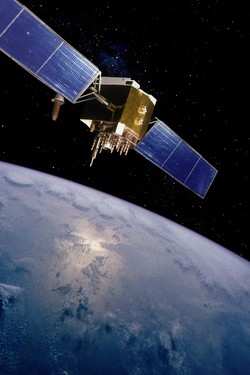Sun, Sep 16, 2007
 Boeing has successfully assembled
and integrated all flight hardware onto the first Global
Positioning System (GPS) IIF satellite. GPS llF will bring new
capabilities to the GPS constellation such as full onboard
encrypted military code, a new civil signal, crosslink
enhancements, signal power increases and longer design life.
Boeing has successfully assembled
and integrated all flight hardware onto the first Global
Positioning System (GPS) IIF satellite. GPS llF will bring new
capabilities to the GPS constellation such as full onboard
encrypted military code, a new civil signal, crosslink
enhancements, signal power increases and longer design life.
"GPS IIF is on track because of the team's stellar application
of back-to-basics program management," said Howard Chambers, vice
president and general manager of Boeing Space and Intelligence
Systems. "The performance of these subsystems is a testament to our
process-based management and to our lean manufacturing commitment,
and GPS IIF fully meets the specifications set forth by our U.S.
Air Force customer and places us firmly on track to deliver the
satellite for the first launch in 2008."
Boeing is building 12 GPS Block IIF satellites under contract
from the Navstar GPS Wing at the Space and Missile Systems Center
in Los Angeles.
The satellite's sophisticated L-band payload will include new
hardware that serves the civil user community. Designed to enhance
non-safety-critical applications, the signals will improve aviation
and other precision safety signals.
Technicians are preparing GPS IIF for key dynamic environmental
tests designed to confirm its structural design and mechanical
integrity. They also are attaching the solar panels and configuring
the satellite before it undergoes several physical tests. The tests
will help ensure robust mission assurance with an emphasis on
product integrity and mission success.
Each GPS IIF satellite will complete acoustic stress tests using
high-powered speakers to verify that the spacecraft can tolerate
the high sound pressure levels during launches; mechanical tests
similar to a separation test to make sure it disconnects cleanly
and correctly from the launch vehicle; tests of its deployable
mechanisms such as the solar wings and the antenna to ensure that
they release correctly on-orbit; and finally, GPS IIF will undergo
thermal vacuum testing to confirm its ability to operate in a
vacuum and under the extreme temperatures of space.
More News
Airport Rotating Beacon A visual NAVAID operated at many airports. At civil airports, alternating white and green flashes indicate the location of the airport. At military airports>[...]
Aero Linx: Fly for the Culture Fly For the Culture, Inc. is a 501(c)(3) non-profit organization that serves young people interested in pursuing professions in the aviation industry>[...]
Klyde Is Having Some Issues Comprehending The Fed's Priorities FMI: www.klydemorris.com>[...]
Also: Viasat-uAvionix, UL94 Fuel Investigation, AF Materiel Command, NTSB Safety Alert Norges Luftsportforbund chose Aura Aero's little 2-seater in electric trim for their next gli>[...]
Also: EP Systems' Battery, Boeing SAF, Repeat TBM 960 Order, Japan Coast Guard H225 Buy Despite nearly 100 complaints totaling millions of dollars of potential fraud, combined with>[...]
 ANN's Daily Aero-Term (04.25.24): Airport Rotating Beacon
ANN's Daily Aero-Term (04.25.24): Airport Rotating Beacon ANN's Daily Aero-Linx (04.25.24)
ANN's Daily Aero-Linx (04.25.24) Klyde Morris (04.22.24)
Klyde Morris (04.22.24) Airborne 04.24.24: INTEGRAL E, Elixir USA, M700 RVSM
Airborne 04.24.24: INTEGRAL E, Elixir USA, M700 RVSM Airborne 04.22.24: Rotor X Worsens, Airport Fees 4 FNB?, USMC Drone Pilot
Airborne 04.22.24: Rotor X Worsens, Airport Fees 4 FNB?, USMC Drone Pilot



